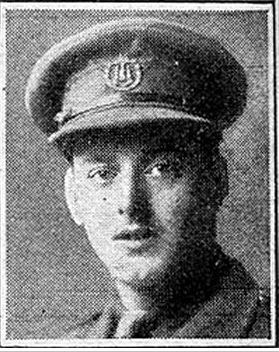Extract from the diary of Sergeant-Major Ernest Shephard
Extract from the diary of Sergeant-Major Ernest Shephard
known 17th May 1916
The strange circumstances around the deaths of Captain W. B. Algeo, Lieutenant H. M. Mansel-Pleydell and Sergeant W. Goodwillie are described in Ernest Shephard’s diaries, published in: Ernest Shephard, A Sergeant-Major’s War: From Hill 60 to the Somme, ed. Bruce Rossor (Ramsbury: Crowood Press, 1987), pp. 96-97. “Wednesday 17th May 1916 A fairly quiet night. I took trench duty from 6.30 a.m. to 9.30 a.m. A fine day, very hot. A great calamity befell my Company and myself at 10 a.m. The enemy trenches opposite run behind a small wood which we call Diamond Wood. Since we have been in this sector the Intelligence Officer went out 2 days ago and brought some iron plates back belonging to enemy. Yesterday afternoon at 4 p.m. in broad daylight Captain Algeo went out from Hammerhead sap and went into the enemy wood smoking his pipe quite cool, returning an hour later. At 10 a.m. this morning, without saying anything, Captain Algeo and Lt Mansell-Pleydell (The Intelligence Officer) went out from the sap. They were seen crossing ‘No Man’s Land’ between sap and wood. When nearly up to edge of wood M-P was seen to beckon, and he and Captain ran into wood. There was a scuffle and Captain Algeo was heard shouting ‘Hands up, hands up, put it down.’ A volley of rifle fire and revolver shots followed, a scream, silence. I heard the commotion and ran up to sap. On finding out the cause I decided it was madness to attempt a rescue party as the enemy would be waiting under cover of the wood, with every advantage. I ordered extra sentries up, and no firing except at enemy plainly seen. (I thought there was a chance that they had been wounded or situated in a position where they could not move.) I ran to Bn HQ and reported, also asked that our artillery should be warned not to fire on the area. The CO was very upset, and gave me permission to send a man to reconnoitre to see if any signs of them. He also ordered me not to go myself on any account, although I wished to do so. I returned to sap and Sgt Goodwillie (the Pioneer Sgt and very well liked by Captain) was given permission to go out, and Sgt Rogers to follow a little way behind. They went out through valley on left of sap, and entered wood safely. A lot of revolver shooting took place, and after ½ hour Rogers returned alone to say he had lost Goodwillie, as he pushed on too quickly. Rogers heard a lot of jabbering and shooting, could see no sign of the Captain, M-P or Goodwillie, so he returned. The CO had meanwhile come up and he ordered that no one should be allowed in ‘No Man’s Land’ for further reconnoitring. We kept a sharp lookout all day and at dusk sent out a patrol who reported that the enemy were working on forward edge of wood. Realised no more could be done, only thing to hope is that they were taken prisoner, and not killed, although I fear the latter, as they were not the sort to give in. The loss of my gallant Captain to the Battalion, my Company, and myself cannot be estimated. He was the bravest officer I have met, first and last thought was for the good and honour of the Bn, his Coy and his men.
Created by: , Michael17221
-

Born 1894
Died 1916
British Army Second Lieutenant /Temporary Lieutenant Dorsetshire Regiment
British Army Second Lieutenant Dorsetshire Regiment 1st Battalion
British Army Lieutenant Dorsetshire Regiment
More about Henry Grove Morton Mansel-Pleydell
